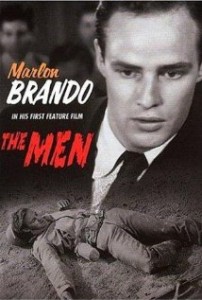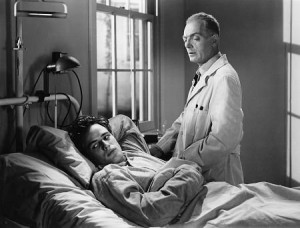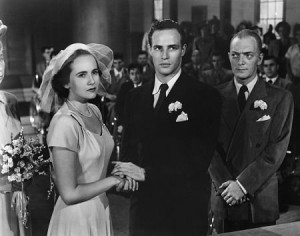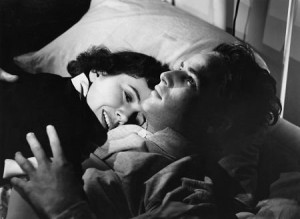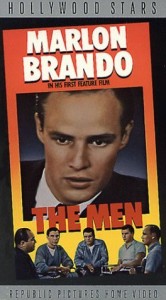The Men **** (1950, Marlon Brando,Teresa Wright, Everett Sloane) – Classic Movie Review 1288
Producer Stanley Kramer and director Fred Zinnemann’s 1950 film stars the young Marlon Brando in his first film, in which he gives an electrifying performance as a World War Two infantry lieutenant who is seriously injured and paralysed by a sniper in battle. Invalided out of combat and the army, he now is a sullen, sarcastic and resentful WWII veteran bitterly struggling to cope with life as he attempts to re-enter society, while his fiancée Teresa Wright and his sympathetic doctor Everett Sloane try to encourage him.
In the hospital, Brando’s character Ken is understandably feeling mighty sorry for himself, but finds no sympathy from his fellow paraplegics, the bitter and caustic Norm (Jack Webb) and happy-go-lucky Leo (Richard Erdman), who smokes cigars and bets on horses.
With his sympathetic and persuasive film-making, director Fred Zinnemann wisely builds the film round Brando’s quite astonishing debut star performance that is still fresh and vivid seeming. The support performances are first too, though. The reviews were great but the film failed to score a hit, perhaps because The Men is too downbeat and depressing.
Writer Carl Foreman, who had previously scripted Champion and Home of the Brave, was Oscar-nominated for his distinguished screenplay. Brando went on immediately to his big breakthrough in A Streetcar Named Desire (1951).
Foreman spent much time at Birmingham Army Hospital, Van Nuys, Los Angeles. Brando also spent two weeks there, living in a ward, undergoing therapy, using a wheelchair and accompanying the patients on recreational activities. Much of the film was shot at the hospital, with 45 of the patients agreeing to appear in it.
http://derekwinnert.com/a-streetcar-named-desire-1951-marlon-brando-classic-film-review-974/
(C) Derek Winnert 2014 Classic Movie Review 1288
Link to Derek Winnert’s home page for more film reviews: http://derekwinnert.com/


